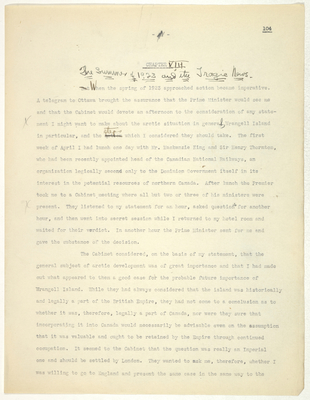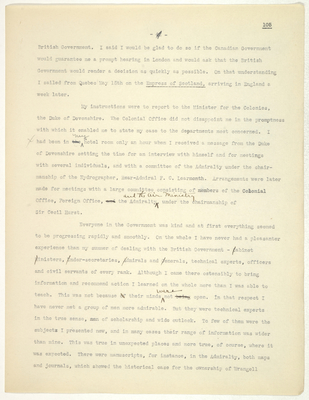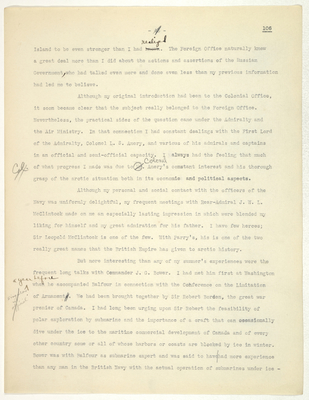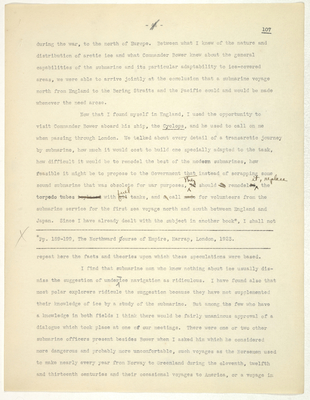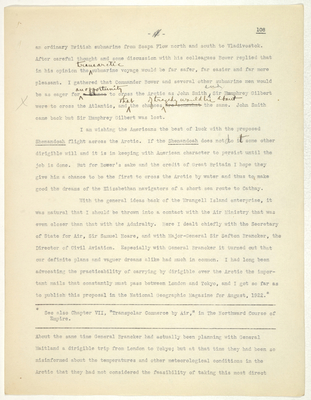Pages
stefansson-wrangel-09-28-001
- [1] -104
CHAPTER VIII
The Summer of 1923 and the Tragic News.
But When the spring of 1923 approached action became imperative. A telegram to Ottawa brought the assurance that the Prime Minister would see me and that the Cabinet would devote an afternoon to the consideration of any stateX ment I might want to make about the arctic situation in general, Wrangell Island in particular, and the action steps which I considered they should take. The first week of April I had lunch one day with Mr. Mackenzie King and Sir Henry Thornton, who had been recently appointed head of the Canadian National Railways, an organization logically second only to the Dominion Government itself in its interest in the potential resources of northern Canada. After lunch the Premier took me to a Cabinet meeting where all but two or three of his ministers were X present. They listened to my statement for an hour, asked questions for another hour, and then went into secret session while I returned to my hotel room and waited for their verdict. In another hour the Prime Minister sent for me and gave the substance of the decision.
The Cabinet considered, on the basis of my statement, that the general subject of arctic development was of great importance and that I had made out what appeared to them a good case for the probable future importance of Wrangell Island. While they had always considered that the island was historically and legally a part of the British Empire, they had not come to a conclusion as to whether it was, therefore, legally a part of Canada, nor were they sure that incorporating it into Canada would necessarily be advisable even on the assumption that it was valuable and ought to be retained by the Empire through continued occupation. It seemed to the Cabinet that the question was really an Imperial one and should be settled by London. They wanted to ask me, therefore, whether I was willing to go to England and present the same case in the same way to the
stefansson-wrangel-09-28-002
105
- 42 -
British Government. I said I would be glad to do so if the Canadian Government would guarantee me a prompt hearing in London and would ask that the British Government would render a decision as quickly as possible. On that understanding I sailed from Quebec May 15th on the Empress of Scotland, arriving in England a week later.
My instructions were to report to the Minister for the Colonies, the Duke of Devonshire. The Colonial Office did not disappoint me in the promptness with which it enabled me to state my case to the departments most concerned. I X had been in the my hotel room only an hour when I received a message from the Duke of Devonshire setting the time for an interview with himself and for meetings with several individuals, and with a committee of the Admiralty under the chairmanship of the Hydrographer, Rear-Admiral F. C. Learmonth. Arrangements were later made for meetings with a large committee consisting of members of the Colonial Office, Foreign Office, and the Admiralty and the Air Ministry, under the chairmanship of Sir Cecil Hurst.
Everyone in the Government was kind and at first everything seemed to be progressing rapidly and smoothly. On the whole I have never had a pleasanter experience than my summer of dealing with the British Government - Cabinet Ministers, Under-secretaries, Admirals and Generals, technical experts, officers and civil servants of every rank. Although I came there ostensibly to bring information and recommend action I learned on the whole more than I was able to teach. This was not because of their minds were not being open. In that respect I have never met a group of men more admirable. But they were technical experts in the true sense, men of scholarship and wide outlook. To few of them were the subjects I presented new, and in many cases their range of information was wider than mine. This was true in unexpected places and more true, of course, where it was expected. There were manuscripts, for instance, in the Admiralty, both maps and journals, which showed the historical case for the ownership of Wrangell
stefansson-wrangel-09-28-003
106
- 43 -
Island to be even stronger than I had known realized. The Foreign Office naturally knew a great deal more than I did about the actions and assertions of the Russian Government, who had talked even more and done even less than my previous information had led me to believe.
Although my original introduction had been to the Colonial Office, it soon became clear that the subject really belonged to the Foreign Office. Nevertheless, the practical sides of the question came under the Admiralty and the Air Ministry. In that connection I had constant dealings with the First Lord of the Admiralty, Colonel L. S. Amery, and various of his admirals and captains in an official and semi-official capacity. I always had the feeling that much [in margin: Col.] of what progress I made was due to Mr. Colonel Amery's constant interest and his thorough grasp of the arctic situation both in its economic and political aspects.
Although my personal and social contact with the officers of the Navy was uniformly delightful, my frequent meetings with Rear-Admiral J. W. L. McClintock made on me an especially lasting impression in which blended my liking for himself and my great admiration for his father. I have few heroes; Sir Leopold McClintock is one of the few. With Parry's, his is one of the two really great names that the British Empire has given to arctic history.
But more interesting than any of my summer's experiences were the frequent long talks with Commander J. G. Bower. I had met him first at Washington a year before when he accompanied Balfour in connection with the Conference on the Limitation [in margin: singular is official] of Armaments. We had been brought together by Sir Robert Borden, the great war premier of Canada. I had long been urging upon Sir Robert the feasibility of polar exploration by submarine and the importance of a craft that can occasionally dive under the ice to the maritime commercial development of Canada and of every other country some or all of whose harbors or coasts are blocked by ice in winter. Bower was with Balfour as submarine expert and was said to have/had more experience than any man in the British Navy with the actual operation of submarines under ice -
stefansson-wrangel-09-28-004
- 44 -
107
during the war, to the north of Europe. Between what I knew of the nature and distribution of arctic ice and what Commander Bower knew about the general capabilities of the submarine and its particular adaptability to ice-covered areas, we were able to arrive jointly at the conclusion that a submarine voyage north from England to the Bering Straits and the Pacific could and would be made whenever the need arose.
Now that I found myself in England, I used the opportunity to visit Commander Bower aboard his ship, the Cyclops, and he used to call on me when passing through London. We talked about every detail of a transarctic journey by submarine, how much it would cost to build one specially adapted to the task, how difficult it would be to remodel the best of the modem submarines, how feasible it might be to propose to the Government that, instead of scrapping some sound submarine that was obsolete for war purposes, it they should be remodeled it, replace the torpedo tubes replaced with oil fuel tanks, and a call made for volunteers from the submarine service for the first sea voyage north and south between England and Japan. Since I have already dealt with the subject in another book*, I shall not ------------------------------------------------------------------------------------------------------- X *Pp. 189-199, The Northward Course of Empire, Harrap, London, 1923. ---------------------------------------------------------------------------------------------------- repeat here the facts and theories upon which these speculations were based.
I find that submarine men who know nothing about ice usually dismiss the suggestion of under-ice navigation as ridiculous. I have found also that most polar explorers ridicule the suggestion because they have not supplemented their knowledge of ice by a study of the submarine. But among the few who have a knowledge in both fields I think there would be fairly unanimous approval of a dialogue which took place at one of our meetings. There were one or two other submarine officers present besides Bower when I asked him which he considered more dangerous and probably more uncomfortable, such voyages as the Norsemen used to make nearly every year from Norway to Greenland during the eleventh, twelfth and thirteenth centuries and their occasional voyages to America, or a voyage in
stefansson-wrangel-09-28-005
108
- 45 -
an ordinary British submarine from Scapa Flow north and south to Vladivostok. After careful thought and some discussion with his colleagues Bower replied that in his opinion the transarctic submarine voyage would be far safer, far easier and far more pleasant. I gathered that Commander Bower and several other submarine men would be as eager for an opportunity a chance to cross the Arctic as John Smith and Sir Humphrey Gilbert X were to cross the Atlantic, and that the chances of tragedy would be about are somewhat the same. John Smith came back but Sir Humphrey Gilbert was lost.
I am wishing the Americans the best of luck with the proposed Shenandoah flight across the Arctic. If the Shenandoah does not do it some other dirigible will and it is in keeping with American character to persist until the job is done. But for Bower's sake and the credit of Great Britain I hope they give him a chance to be the first to cross the Arctic by water and thus to make good the dreams of the Elizabethan navigators of a short sea route to Cathay.
With the general ideas back of the Wrangell Island enterprise, it was natural that I should be thrown into a contact with the Air Ministry that was even closer than that with the Admiralty. Here I dealt chiefly with the Secretary of State for Air, Sir Samuel Hoare, and with Major-General Sir Sefton Brancker, the Director of Civil Aviation. Especially with General Brancker it turned out that our definite plans and vaguer dreams alike had much in common. I had long been advocating the practicability of carrying by dirigible over the Arctic the important mails that constantly must pass between London and Tokyo, and I got so far as to publish this proposal in the National Geographic Magazine for August, 1922.* ------------------------------------------------------------------------------------------------------------------------- * See also Chapter VII, "Transpolar Commerce by Air," in The Northward Course of Empire. ------------------------------------------------------------------------------------------------------------------------- About the same time General Brancker had actually been planning with General Maitland a dirigible trip from London to Tokyo; but at that time they had been so misinformed about the temperatures and other meteorological conditions in the Arctic that they had not considered the feasibility of taking this most direct
